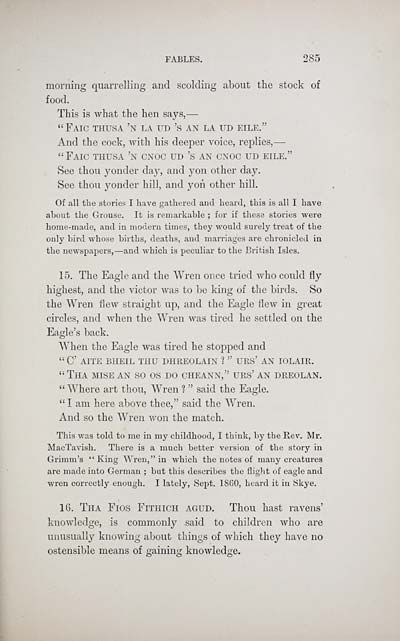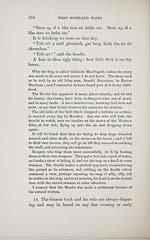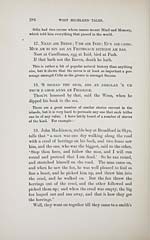Download files
Complete book:
Individual page:
Thumbnail gallery: Grid view | List view

285
morning quarrelling and scolding about the stock of
food.
This is what the hen says, —
" Faic thus a 'n la ud 's an la ud eile."
And the cock, with his deeper voice, replies, —
" Faic thusa 'n cnoc ud 's an cnoc ud eile."
See thou yonder day, and yon other day.
See thou yonder hill, and yon other hill.
Of all the stories I have gathered and heard, this is all I have
about the Grouse. It is remarkable ; for if these stories were
home-made, and in modern times, they would surely treat of the
only bird whose biiihs, deaths, and marriages are chronicled in
the newspapers, — and which is peculiar to the British Isles.
15. The Eagle and the Wren once tried who could fly
highest, and the victor was to be king of the birds. So
the Wren flew straight up, and the Eagle flew in great
circles, and when the Wren Avas tired he settled on the
Eagle's back.
When the Eagle was tired he stopped and
" C AITE BHEIL THU DHREOLAIN ? " URS' AN lOLAIR.
"ThA MISE an so OS DO CHEANN," URS' AN DREOLAN.
"Where art thou. Wren ? " said the Eagle.
" I am here above thee," said the Wren.
And so the Wren won the match.
This was told to me in my childhood, I think, by the Rev. Mr.
MacTavish. There is a much better version of the story in
Grimm's "King Wren," in which the notes of many creatures
are made into German ; but this describes the fliglit of eagle and
wren correctly enough. I lately, Sept. 1S60, heard it in Skye.
16. Tha Fios Fithich agud. Thou hast ravens'
knowledge, is commonly said to children who are
unusually knowing about things of which they have no
ostensible means of gaining knowledge.
morning quarrelling and scolding about the stock of
food.
This is what the hen says, —
" Faic thus a 'n la ud 's an la ud eile."
And the cock, with his deeper voice, replies, —
" Faic thusa 'n cnoc ud 's an cnoc ud eile."
See thou yonder day, and yon other day.
See thou yonder hill, and yon other hill.
Of all the stories I have gathered and heard, this is all I have
about the Grouse. It is remarkable ; for if these stories were
home-made, and in modern times, they would surely treat of the
only bird whose biiihs, deaths, and marriages are chronicled in
the newspapers, — and which is peculiar to the British Isles.
15. The Eagle and the Wren once tried who could fly
highest, and the victor was to be king of the birds. So
the Wren flew straight up, and the Eagle flew in great
circles, and when the Wren Avas tired he settled on the
Eagle's back.
When the Eagle was tired he stopped and
" C AITE BHEIL THU DHREOLAIN ? " URS' AN lOLAIR.
"ThA MISE an so OS DO CHEANN," URS' AN DREOLAN.
"Where art thou. Wren ? " said the Eagle.
" I am here above thee," said the Wren.
And so the Wren won the match.
This was told to me in my childhood, I think, by the Rev. Mr.
MacTavish. There is a much better version of the story in
Grimm's "King Wren," in which the notes of many creatures
are made into German ; but this describes the fliglit of eagle and
wren correctly enough. I lately, Sept. 1S60, heard it in Skye.
16. Tha Fios Fithich agud. Thou hast ravens'
knowledge, is commonly said to children who are
unusually knowing about things of which they have no
ostensible means of gaining knowledge.
Set display mode to: Large image | Transcription
Images and transcriptions on this page, including medium image downloads, may be used under the Creative Commons Attribution 4.0 International Licence unless otherwise stated. ![]()
| Early Gaelic Book Collections > Matheson Collection > Popular tales of the west Highlands > Volume 1 > (437) |
|---|
| Permanent URL | https://digital.nls.uk/81392472 |
|---|
| Description | Volume I. |
|---|---|
| Shelfmark | Mat.74 |
| Additional NLS resources: | |
| Attribution and copyright: |
|
| Description | Items from a collection of 170 volumes relating to Gaelic matters. Mainly philological works in the Celtic and some non-Celtic languages. Some books extensively annotated by Angus Matheson, the first Professor of Celtic at Glasgow University. |
|---|
| Description | Selected items from five 'Special and Named Printed Collections'. Includes books in Gaelic and other Celtic languages, works about the Gaels, their languages, literature, culture and history. |
|---|

